As Sudan’s rival forces vie for power, who pays the price?
Analysts warn that the army and Rapid Support Forces’ respective quest to consolidate power could spark a wider conflict.
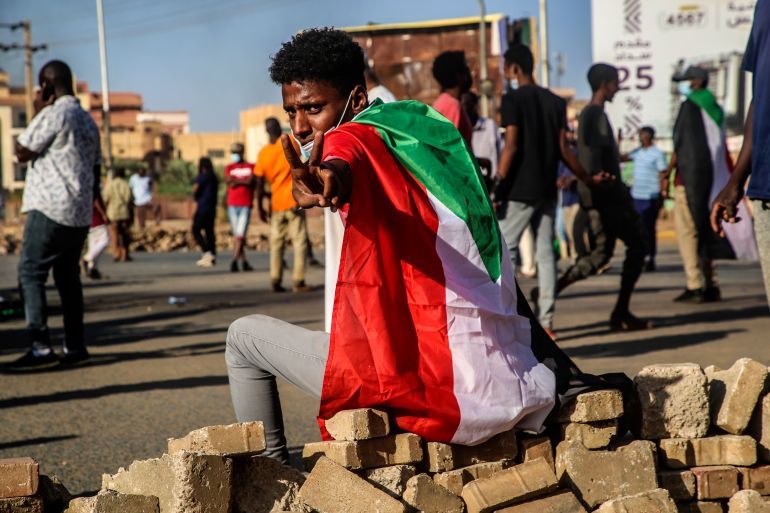
On March 11, army commander Abdel Fattah al-Burhan and Rapid Support Forces (RSF) leader Mohamad Hamdan “Hemeti” Dagalo met in Khartoum’s military headquarters, seemingly ending their rift which has simmered since Sudan’s former strongman president, Omar al-Bashir, was toppled in April 2019.
The two armed bodies have been vying for supremacy as the army tries to establish its authority over all the country’s military forces and the RSF works to maintain its independence.
Keep reading
list of 4 itemsPhotos: Thousands protest in Georgia over contentious ‘foreign agents’ bill
Pro-Palestinian protesters paralyse roads in US cities over war on Gaza
Lawmakers brawl as Georgian Parliament considers ‘foreign agent’ bill
However, analysts warn that their respective quest to consolidate power puts them at odds in the long term and could lead to a wider conflict that destabilises the country and sabotages popular aspirations for democracy – despite an announcement on Sunday that Sudan’s political factions have agreed to form a new transitional government on April 11.
That announcement came on the back of negotiations between political parties and the military, and the transitional government agreement will see a representative from both the army and the RSF sit alongside civilians to draft a new constitution.
And yet, in October 2021, it was the army and the RSF that worked together to overthrow the civilian administration that was in place after al-Bashir’s overthrow. The army’s coup partner was born out of the Arab tribal militias that, at al-Bashir’s bidding, spearheaded mass killings of non-Arab tribes in Darfur who were protesting against their isolation and neglect by the central government.
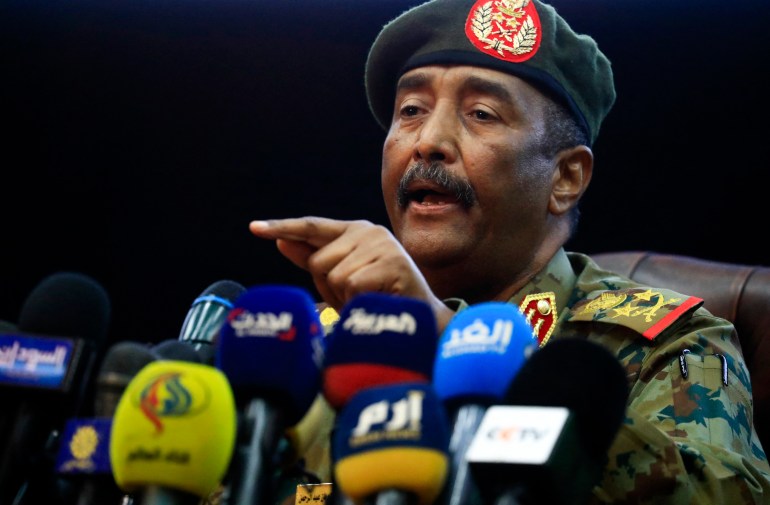
In 2013, al-Bashir repackaged many of the fighters from those militias into the RSF to coup-proof his regime from senior military officers and his feared National Intelligence Security Services. The RSF enjoyed a separate chain of command from the military, which persisted after al-Bashir was toppled and has caused some friction.
Integrating the RSF into the army
The army and RSF signed a UN-backed Framework Agreement on December 5 last year, promising to surrender power to a civilian government later on. Also signatories to the Framework Agreement were the civilian political parties that comprise the Forces for Freedom and Change, a civilian coalition, as well as some smaller civil society groups.
But analysts say that the settlement has exacerbated tensions between the two forces by promoting Hemeti, who was formerly the deputy to al-Burhan on the post-Bashir Sovereign Council, to the army commander’s equal in a new Security and Defense Council that would be led by a civilian.
“The central tension is the issue of [RSF] integration into [the army] and how quickly it should happen and under what conditions. Should it be preceded by reform or not,“ said Kholood Khair, founding director of Confluence Advisory, a think tank in Sudan’s capital, Khartoum.
“Every time … it gets harder and harder [for them] to hold [a rapprochement],” Khair said.
The Framework Agreement calls for the absorption of the RSF into the army after a discussion process but several military officials, including al-Burhan, have demanded that integration happen sooner rather than later.
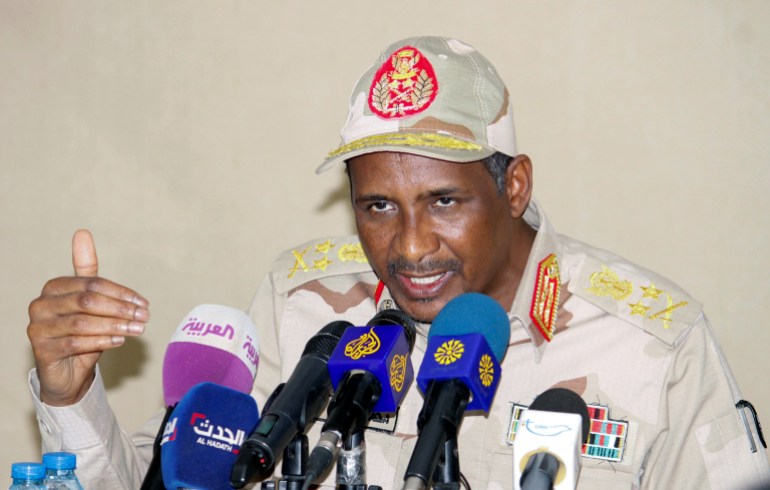
The RSF agreed to integrate but gave no timetable and, one week before the March 11 meeting, its second-in-command – Hemeti’s brother Abdel Rahim Dagalo – urged the army publicly to surrender power to a civilian government. The move aimed to portray the RSF as defenders of the pro-democracy movement, despite its arrest and killing of protesters in the past.
The pro-democracy movement
Two months after al-Bashir’s removal, the RSF led the dispersal of a protest site outside the defence ministry in Khartoum on June 3, 2019. That day, more than 120 people were killed in a few hours while they were demanding that security forces hand over power to a civilian government.
Survivors said the military had sealed the gates to its headquarters to keep protesters from escaping the onslaught.
Despite the violence, resistance committees – neighbourhood groups that organise regular nationwide protests – were as instrumental in maintaining pressure on the generals as they were in overthrowing al-Bashir. As the heartbeat of the grassroots pro-democracy movement, they oppose Hemeti and al-Burhan and remain uncompromising in their demand for full civilian rule.
“Protesters on the street just have one message for Hemeti and al-Burhan … we just want our rights and nothing more than our rights,” Mabrooka Rabih, a 25-year-old member of a resistance committee, told Al Jazeera.
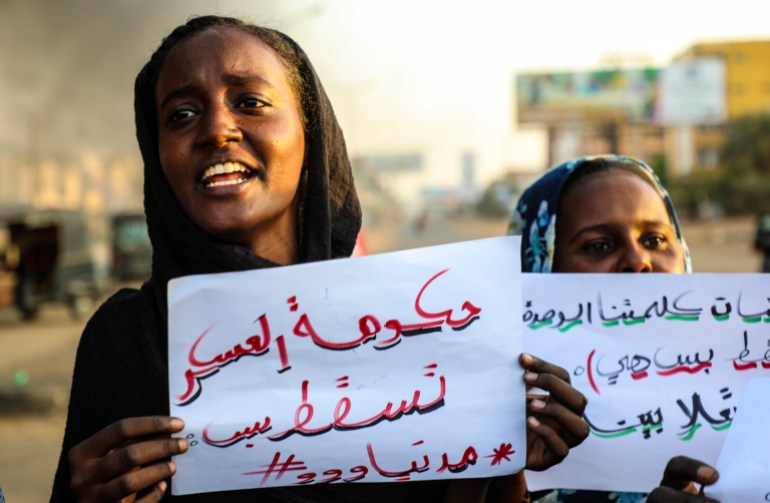
“We also want the rights for all the martyrs that [Hemeti and al-Burhan] killed in the protests … but nobody until now has been sentenced or held accountable.”
Since the October military takeover, at least 125 civilians have been confirmed killed in anti-coup protests in Khartoum, while dozens more have been disappeared and held in incommunicado detention for weeks and sometimes months. Many young people have also been injured badly.
Outside Khartoum, hundreds more people have died from protracted conflicts that the coup authorities are accused of exacerbating by manipulating or inflaming local tensions to obtain lucrative resources or political gain.
Rivals in arms?
The RSF has long sought more weapons to level the playing field with the military. On the eve of Russia’s invasion of Ukraine, Hemeti travelled to Moscow to request combat helicopters to neutralise the army’s air capabilities, according to Africa Intelligence, a leading source of intel and analysis on the continent.
While the Kremlin did not grant Hemeti’s request, the same source reported that it promised to send more mercenaries from Russia’s Wagner Group, which has had ties with the RSF dating back to 2017, when al-Bashir met President Vladimir Putin in Sochi and promised to support Russia’s positions in the region.
Both the RSF and the army have benefitted from security training and arms shipments from Moscow in exchange for gold, a commodity that helps the Kremlin build some resilience to Western sanctions. Russia also covets Sudan’s strategic Red Sea port, which al-Bashir promised it in 2017.
The United States has pressured al-Burhan to root Wagner out of the country in exchange for Western support and it – along with regional players like Saudi Arabia and the United Arab Emirates (UAE) – has long opposed any plan to grant the port to Russia.
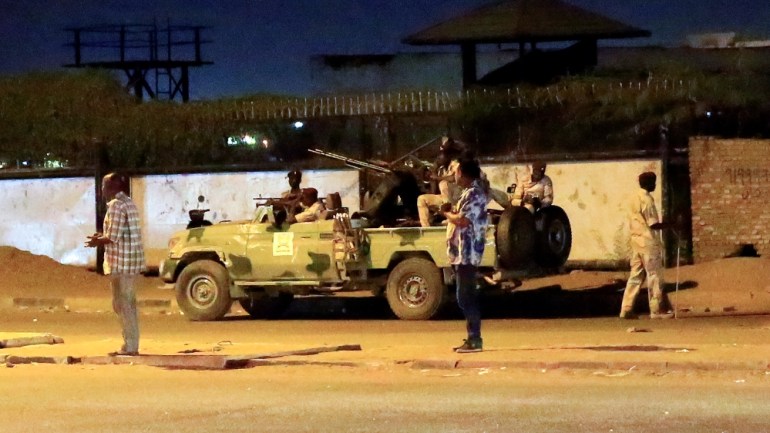
In January, Egypt’s spy chief Abbas Kamal also reportedly met al-Burhan and raised the Wagner issue on behalf of the US.
But, according to Suliman Baldo, founder of the Transparency and Policy Tracker think tank covering political affairs in Sudan, Washington’s strategy is misplaced because al-Burhan himself has business relationships with Wagner entities such as Meroe Gold and M-Invest, two companies sanctioned by the European Union and the US.
“It will be really ill-advised if they [Washington] view the military as a more reliable partner than the RSF. The military is a retailer that is simply looking to profit from any situation,” he told Al Jazeera.
Khair added that US partners like Egypt and the UAE are backing al-Burhan and Hemeti respectively in order to safeguard their strategic interests and investments.
“The net impact is that neither general sees a mutual outcome that would lessen the security dilemma between them,” she told Al Jazeera. “In the end … [Burhan and Hemeti] may end up precipitating a state of competition that can only be resolved militarily.”
Flexing muscles
The RSF has reportedly stepped up recruitment in the region of Darfur since last summer, prompting rival militias and the army to try and keep pace, according to the latest UN Panel of Experts report (PDF) on Sudan.
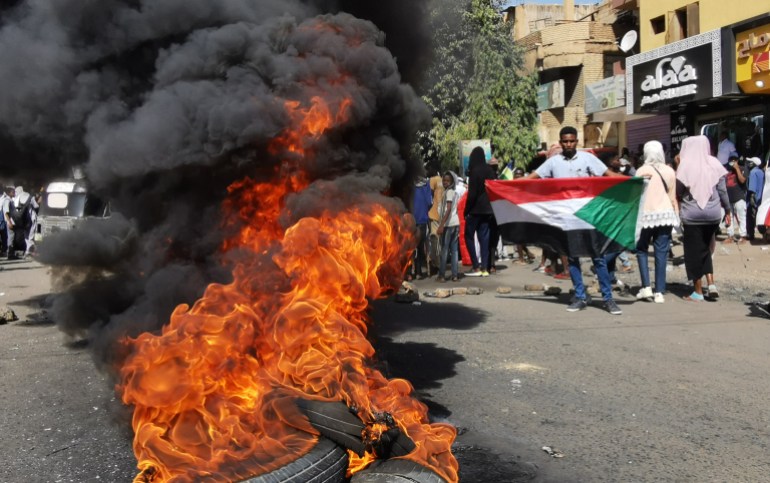
Earlier this month, reports appeared of Arab tribal activists in Darfur accusing the army of recruiting fighters who supported Hemeti’s rival Musa Hilal into a new border force in an attempt to undercut Hemeti’s relevance in his stronghold.
Al Jazeera reached out to the RSF’s media officer Ali Musabel and military spokesman Nabil Abdullah to ask them about the allegations, but neither responded to the queries.
On the same day as the report about army recruitment in Darfur came out, the RSF confirmed to the media that it had brought 700 new recruits to Khartoum, saying they were there for training and had nothing to do with its dispute with the military. Yet, some reports claimed the army responded by putting its troops on high alert.
The growing militarisation has many fearing that any small dispute could trigger a wider conflict.
But analysts say a more likely scenario would see the military outsourcing violence as they have traditionally done in the past – in spite of that being the strategy that eventually led to the creation of the RSF.
“I think the army has been instrumental in strengthening Hemeti rather than limiting him. I don’t see any room for direct military confrontation between them, because I think both know it would be at a high cost for both entities and the civilian population,” Baldo told Al Jazeera.
“Politically, it’s a game of back and forth between the two.”